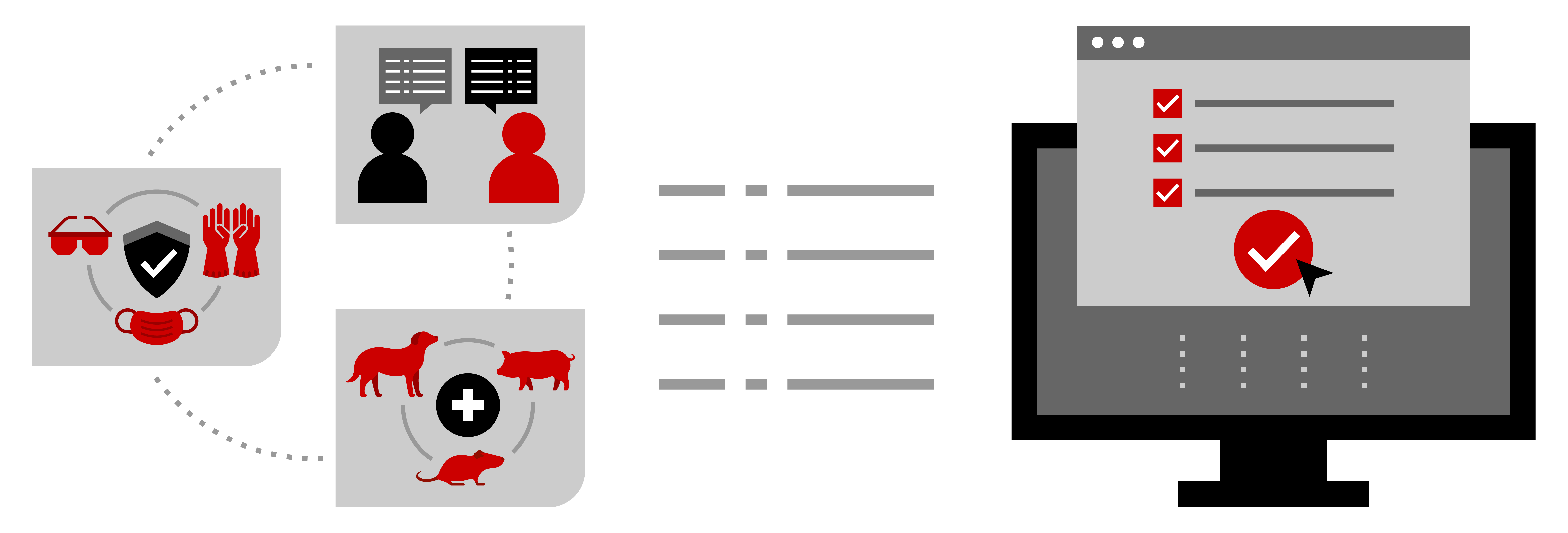
Step 2: Preparing and Submitting an AVAU
Principal Investigators (“PIs”) are responsible for ensuring adherence to approved IACUC protocols or Application for Vertebrate Animal Use (AVAU); compliance with NC State policies, standards and procedures, as well as federal and state regulations and guidelines governing the use of animals; and the humane care and use of animals. PIs may delegate duties to research personnel, but they remain responsible for all aspects of their research projects, including the actions of project participants.
PI Requirements
According to REG 10.10.01 Animal Care and Use Procedures, Principal Investigators must be of faculty rank or EHRA staff with approval of the department chairperson. Principal Investigators (PIs) are responsible for animal use by their students and staff. The PI heading a research group or teaching a course must have an approved application on file for each project or course using NC State-owned animals under his/her supervision. Collaborators, technicians, and students must care for and use animals according to the protocols described in the approved applications.
Federal Funding Requirements
- Research Using Vertebrate Animals: NIH (guidance for PIs)
- PHS Policy and the NIH Grants Policy Statement (NIH GPS, chapter 4.1.1.2) require the institution to verify, before award, that the IACUC has reviewed and approved those components of grant applications and contract proposals related to the care and use of animals. This is not an explicit requirement for the IACUC to do a side-by-side comparison of an application/proposal and the IACUC protocol. However, institutions are responsible for ensuring that the information the IACUC reviews and approves is congruent with what is in the application/proposal. Institutions are free to devise a workable mechanism to accomplish this end. One method to prevent inconsistencies between the information submitted to PHS and that on the IACUC protocol is to implement a procedure for direct comparison. Some institutions have delegated this responsibility to a particular office or position (e.g., sponsored programs or compliance office); others ask departmental chairs to verify consistency.
Congruency Review
The IACUC office will provide a congruency review of the protocol to the grant proposal and can provide a letter of congruency for your sponsor (NIH, NSF, USDA NIFA, or DoD).
Funded Research Conducted at NC State Under a Sponsor or Third Party (Small Start-up)
In cases where a third party or start-up company would like to conduct animal research at an NC State facility or unit, the following is required:
- An NC State faculty rank personnel must assume the role of PI on the protocol submission.
- Federal funding awarded to the sponsor or start-up company must be connected to the NC State Assurance number through completion of an Inter-Institutional Assurance provided through OLAW.
SubAwarded Animal Research
In the case where NC State is awarded Federal Funding to conduct research and subawards out animal research portions to another institution, the NC State IACUC has the responsibility to ensure that the subawarded institution has an OLAW Assurance, and an IACUC protocol was approved at that location to cover the work. In some cases, a Memorandum of Understanding (MOU) is recommended to delineate which IACUC covers what portions of the research and how adverse events are reported to OLAW if needed. For NSF, if both institutions are independently awarded funds, this is not required.
Requirements to Conduct Work with Animals
- Personnel Training Required: OHS Requirements and CITI Training
- RED Training: The Animal Care and Use (IACUC) module of the Research Enterprise Data (RED) system is used to manage IACUC protocols and other aspects of regulatory compliance related to the safety and wellbeing of live vertebrate animals utilized in research, teaching and other scholarly pursuits by the university.
- Standard operating procedures and responsibilities of the PI for creating and submitting an Application for Vertebrate Animal Use (AVAU) as required to conduct activities with animals on behalf of NC State University and provides guidance on proper conduct of procedures with animals.
- Veterinary consultation is required for all protocols in a pain category of D or E and strongly recommended for all projects where the PI or other personnel will be working with the animal models for the first time or require training and oversight prior to conducting study procedures.
- Facility coordination for animal projects or teaching: All animal work should be conducted at an approved NC State facility or unit. A project planning meeting may be required with the facility manager or unit supervisor to coordinate study or teaching planning. Explore research facilities:
Environmental Health and Safety Requirements
- Other reviews: EHS may require chemical review, radiation safety or IBC committee approval. The IACUC process includes safety personnel and approval prior to permitting IACUC approval of a project that has safety hazards.
- Chemicals to be administered to animals must be listed on the IACUC AVAU protocol and an RMHC form completed and attached.
- Radiation safety applies to radioisotopes used in animals, and also includes most imaging devices including, X ray equipment, CAT scans, and MRI equipment.
- The IBC committee process is separate from the IACUC review process and can add 1-3 months to your review and approval so please plan accordingly.
Submitting Your Application
Once you have completed the IACUC protocol form in the RED system and all fields are completed, you can submit the application in RED.
If you are not the PI, the submission does not come to the IACUC office. The PI receives an email and action item in RED to review the submission Guide – PI Approval Process
If you aren’t sure where your protocol is, you can take a few actions:
Look in the RED system under ‘records I am named on widget” or by typing the protocol number into the quick find box to open the application and see if it is in the IACUC office or still in PI approval.
Once the IACUC office receives the protocol it starts the pre-review process.
IACUC Lifecycle
View full lifecycle